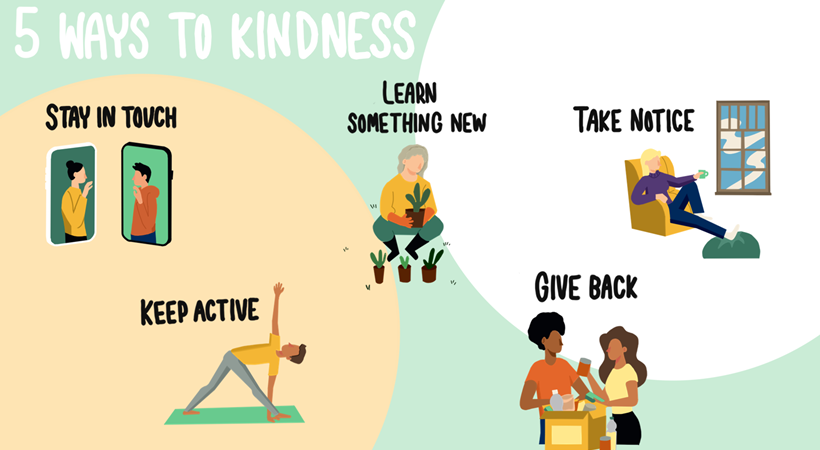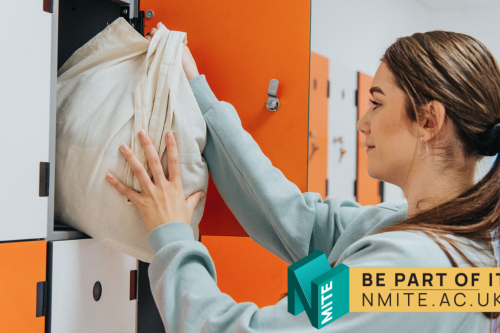Mary Kenyon—James previously worked as a Mental Health Nurse for both the NHS and the private sector. Following this, Mary has spent the past 16 years in the Further and Higher Education sectors using her wealth of experience to support young people. We now welcome Mary as Head of Student Experience at NMITE, and for Mental Health Week (which takes place this year between 18th -24th May), she gives us her thoughts on why it is so important to be kind.
Promoted by the Mental Health Foundation, the focus of Mental Health Week this year is Kindness. This motivated me to share my thoughts about how being kind to ourselves and to others has a positive impact on our own mental wellbeing. The link between mental health and active promotion of our own wellbeing is well documented; the NHS and mental health charity, Mind, endorse and promote the 5 ways to Wellbeing.
First, we need to be kind to ourselves…
It’s essential to have a healthy work-life balance, with the pace of life ever-increasing, we will all have good days, when we feel focused and are satisfied in our achievements, but we will also have days when our mental wellbeing is not so good; we may feel despondent and lack motivation.
It’s important that we are kind to ourselves and are active in maintaining our mental wellbeing; we can do this a number of ways:
Stay in touch. In an ordinary world I’d encourage you to socialise, visit your family and friends, take part in activities. In our current world it’s all the more important to connect with others even if it may be a little more difficult to do so at present; send a meaningful text, get on the phone or make a video call. Normally at NMITE, many of us meet up informally to have lunch together. During recent times when working from home, we have maintained this by having a virtual drop-in lunchtime meeting; it’s good to stay in touch.
Keep active. If you are not someone (and this includes me!) that has a regular active lifestyle; using the gym, running, cycling etc; the easiest way to keep active is to simply go for a walk, and get some fresh air. Do this around lunchtime, and it will really boost your energy levels for the afternoon.
Take notice of the things around you, hit the ‘stop’ button, even if just for a few minutes. Wherever you are, clear your mind, take notice of what your senses are telling you, take notice of what sounds you can hear, what sensation is on your skin, what you can smell around you. This can take a bit of practise to train your mind not to revert to other thoughts, there are several apps around that can help you with mindfulness.
Learning something new can give you a great sense of achievement; some people naturally have an appetite to always try new things. If this is not you, be realistic and set yourself a realistic goal, think about something you are interested in, consider a purpose. This year I have installed a greenhouse and have learnt a lot more about growing vegetables! It needn’t be anything big, it could be as simple as asking Alexa, ‘tell me the fact of the day’; it’s all learning and you never know, learning that the tallest tree in the world is a 116 metre tall Californian Redwood just might come in handy during a quiz night!
Be kind, thoughtful, and give back to others. This is something that can be achieved every day and it doesn’t have to take much time. In an ordinary world, there are numerous things we can do. But in our current climate, why not send a letter? Make a person in your household, if you have one, an unprompted cup of tea; or smile or say hello to a stranger whilst out walking. If you have a little more time you could do some volunteering or have a sort out at home and ready unwanted items to donate to charity.
Be kind to each other…
It’s important that we look out for each other too. We share a responsibility to take notice and support our family, friends and colleagues in maintaining their mental wellbeing. For me, having worked with young people for most of my career, it’s about noticing a small change, it’s about making contact, giving someone time to talk and it’s about listening, really listening. It’s not always about having all the answers.
It’s as simple as asking if someone is ok, take an interest and take notice of what they are doing and saying. Encouraging someone to talk or seek help will have a huge positive impact on someone else’s wellbeing and in turn, your own. If somebody doesn’t want to talk at that time, that’s ok too, it’s about them knowing that you care and will make time when they are ready.
There is a member of staff at NMITE who each week usually does a ‘fruit walk’. Whilst eating a piece of fruit they go around to visit the teams, say hello, how are you, what are you working on? For me as a new member of staff this was incredibly welcoming, gave me a sense of belonging and a feeling that this member of staff cares about my wellbeing.
Why kindness…
Being kind and showing kindness costs nothing, it feels good and those on the receiving end will also feel good.
“Kindness strengthens relationships, develops community and deepens solidarity. It is a cornerstone of our individual and collective mental health.” – Mental Health Foundation, May 2020
During Mental Health week at NMITE we will be using resources available from the Mental Health Foundation to practise and reflect on acts of kindness to ourselves and others, join with us and share your stories - #KindnessMatters and #MentalHealthAwarenessWeek
I hope you have enjoyed reading my thoughts.... be kind, and you will receive kindness.







